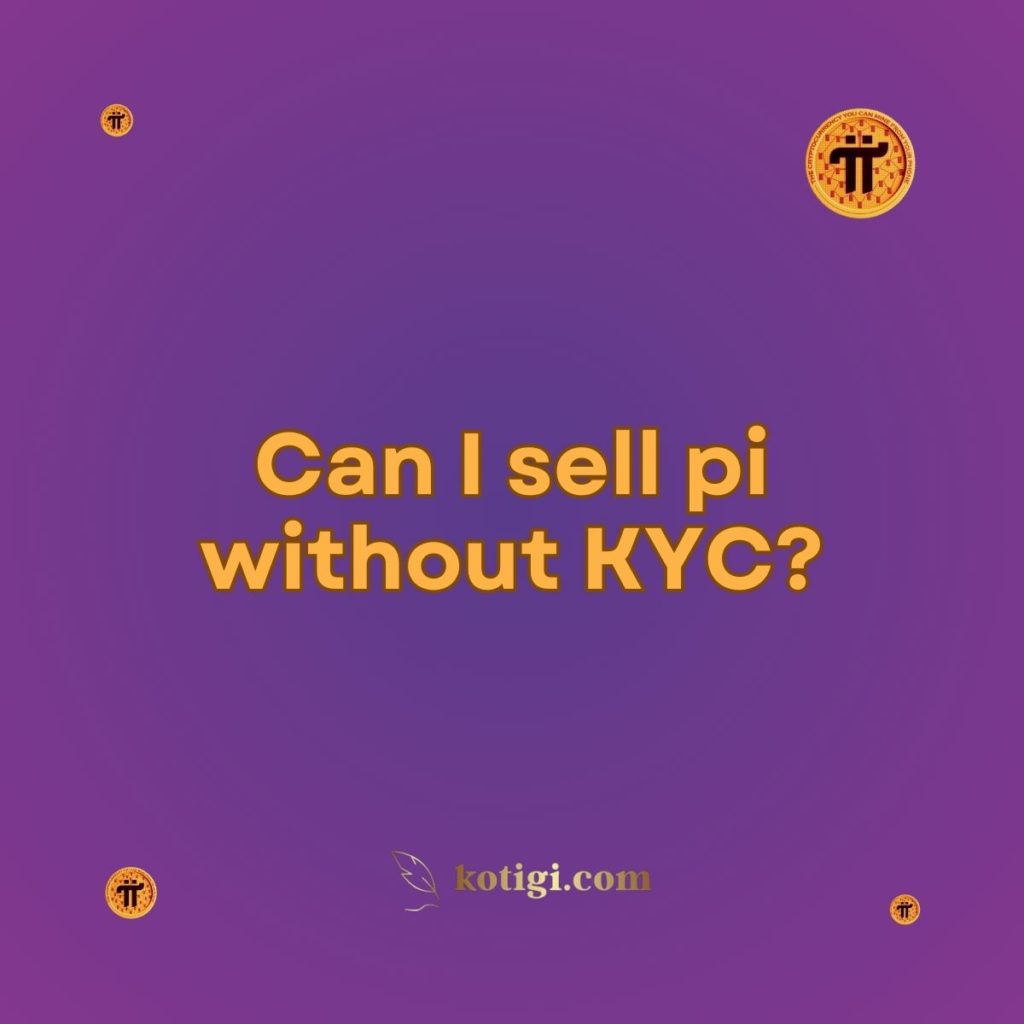
Can I sell pi without KYC?
No, currently you cannot sell Pi coins without completing the Know Your Customer (KYC) verification process. Pi Network requires all users to pass KYC to ensure the authenticity of accounts and comply with regulatory standards before allowing them to transfer or sell their Pi.
Introduction
Pi Network has gained significant attention due to its unique mobile mining model, allowing millions of users to earn Pi coins with ease. As the project progresses, many users are eager to know whether they can sell their Pi without undergoing the Know Your Customer (KYC) verification process. In this article, we’ll explore the purpose of KYC in Pi Network, the current requirements, and whether it’s possible to trade Pi coins without it.
Understanding Pi Network’s KYC Requirements
What is KYC?
KYC, or Know Your Customer, is a process used by financial institutions and cryptocurrency projects to verify the identity of their users. It involves collecting personal information such as government-issued IDs, addresses, and sometimes biometric data to ensure that users are legitimate and not involved in illegal activities such as money laundering or fraud.
For Pi Network, KYC serves as a safeguard to ensure that the network remains secure and free from spam accounts, bots, and fraudulent activity. By requiring users to complete KYC, Pi Network can verify that each participant is a real person, which is crucial for the integrity of the network.
Why Does Pi Network Require KYC?
Pi Network has been clear about its intention to create a decentralized and secure cryptocurrency ecosystem. Part of this effort involves making sure that only real people are mining Pi and participating in the network. KYC helps to achieve this by ensuring that each user account is tied to a verified identity.
Moreover, KYC is necessary for regulatory compliance. As the cryptocurrency landscape continues to evolve, governments and regulatory bodies are imposing stricter rules on digital assets to prevent illegal activities. By implementing KYC, Pi Network aligns itself with these regulations, reducing the risk of legal issues down the line.
Can You Sell Pi Without KYC?
Current Status of Pi Trading
At present, Pi Network is still in its enclosed mainnet phase, meaning that Pi coins cannot be traded or sold on public exchanges. This phase is designed to allow the network to finalize its development, including ensuring that only legitimate users have access to their Pi through KYC verification.
In this enclosed mainnet phase, Pi can be used within the Pi ecosystem for peer-to-peer transactions and exchanges for goods and services in approved marketplaces. However, all users must pass KYC to transfer Pi, even within the enclosed ecosystem. As such, it is not currently possible to sell or transfer Pi without first completing KYC.
Why KYC is Mandatory for Selling Pi
KYC is a critical requirement for any legitimate cryptocurrency, especially one that aims to be listed on major exchanges in the future. Exchanges typically require cryptocurrencies to comply with regulations, including anti-money laundering (AML) and counter-terrorism financing (CTF) laws. These laws mandate that all users must undergo KYC before trading to ensure the legal integrity of the transactions.
For Pi Network, KYC is not just about regulatory compliance. It is also a tool to prevent abuse of the system. During the early phases of Pi Network, some users may have created multiple fake accounts to mine more Pi. KYC helps to eliminate these fake accounts and ensure that only real, verified users can participate in the network and trade their Pi coins.
What Happens If You Don’t Complete KYC?
Restricted Access to Pi
If a user does not complete the KYC process, they will not be able to transfer, sell, or even access their Pi coins. Pi Network has been clear that only users who have passed KYC will be able to migrate their Pi coins from the enclosed mainnet to the open mainnet once it is launched. This means that non-KYC users will effectively be locked out of the trading process until they verify their identities.
Impact on Future Trading Opportunities
As the Pi Network moves toward launching its open mainnet, KYC will remain a prerequisite for trading on public exchanges. If you do not complete KYC, you will miss out on the opportunity to sell your Pi when it becomes tradable. Additionally, many cryptocurrency exchanges have their own KYC requirements, meaning that even if Pi Network allowed non-KYC transfers, exchanges would still require verification before letting you sell Pi coins.
How to Complete Pi Network KYC
KYC Process in Pi Network
Pi Network uses a third-party service to handle KYC verification. Users are prompted within the Pi app to complete the KYC process when they become eligible. The process typically involves submitting personal identification documents, such as a passport or national ID, and sometimes providing a selfie or other biometric verification to confirm identity.
Once you have submitted your documents, the verification process may take some time, depending on the number of users applying for KYC at the same time. Pi Network has assured users that they are working on scaling the KYC process to handle the large number of miners who need to be verified.
Steps to Pass KYC
- Wait for Eligibility: Not all users are eligible for KYC immediately. The Pi Network team is gradually rolling out KYC invitations to users based on various factors.
- Receive KYC Invitation: When eligible, users will receive a notification within the Pi app to start the KYC process.
- Submit Identification Documents: You will be required to submit a government-issued ID, such as a passport, driver’s license, or national ID card.
- Complete Biometric Verification: Some users may need to submit a selfie or perform other biometric tasks to verify their identity.
- Wait for Approval: Once all documents are submitted, the verification process can take some time. Users will be notified of their KYC status once it has been reviewed.
What If You Fail KYC?
If you fail KYC due to document verification issues or identity mismatches, Pi Network may give you an opportunity to correct the problem and resubmit your documents. It is essential to ensure that your documents are valid and that all information matches to avoid delays or rejections.
In cases where users fail KYC and cannot resolve the issue, they will be unable to transfer or sell their Pi coins.
Alternatives to Selling Pi Without KYC
Peer-to-Peer Exchanges Within Pi Network
While you cannot sell Pi without KYC, there are some ways to use your Pi within the network. Pi’s enclosed mainnet allows users to trade Pi for goods and services with other users through peer-to-peer exchanges. However, even for these transactions, KYC is required to ensure that both parties are verified and legitimate.
Waiting for Open Mainnet
Once Pi Network transitions to the open mainnet, it is expected that Pi will be listed on major cryptocurrency exchanges. At that point, you will be able to trade Pi for other cryptocurrencies or fiat currencies. However, as mentioned earlier, KYC will still be necessary for these trades, both within Pi Network and on the exchanges where Pi is listed.
Will Pi Network Ever Allow Non-KYC Transactions?
The Future of KYC in Pi Network
It is unlikely that Pi Network will allow non-KYC transactions in the future. As cryptocurrencies become more regulated, KYC is becoming a standard requirement for all legitimate projects. Allowing non-KYC transactions would expose Pi Network to regulatory risks and could harm its reputation in the cryptocurrency space.
Moreover, allowing users to trade without KYC would undermine Pi Network’s efforts to maintain a secure and authentic ecosystem. Without KYC, it would be much easier for fraudulent accounts and bots to participate in the network, reducing trust in the system.
Compliance with Global Regulations
As Pi Network aims to operate on a global scale, it will need to comply with the regulations of various countries. Most countries now require KYC for cryptocurrency transactions to prevent illegal activities. By adhering to these regulations, Pi Network can avoid legal issues and create a trustworthy environment for its users.
Conclusion
In summary, Pi Network requires users to complete the KYC verification process before they can transfer or sell their Pi coins. This requirement ensures that only real, verified users can participate in the network and helps Pi comply with global regulatory standards. While it is currently not possible to sell Pi without KYC, completing the KYC process will be essential for those looking to trade Pi once the open mainnet is launched. As Pi Network continues to develop, KYC will remain a critical component of its security and compliance measures.
Key Takeaways:
- Pi Network requires all users to complete KYC before transferring or selling Pi.
- KYC helps prevent fraud, ensures regulatory compliance, and verifies users.
- Without KYC, users will not be able to access or sell their Pi coins.
- The open mainnet launch will enable Pi trading, but KYC will still be mandatory for participation.
- There are no current plans for non-KYC transactions within Pi Network due to security and regulatory reasons.





